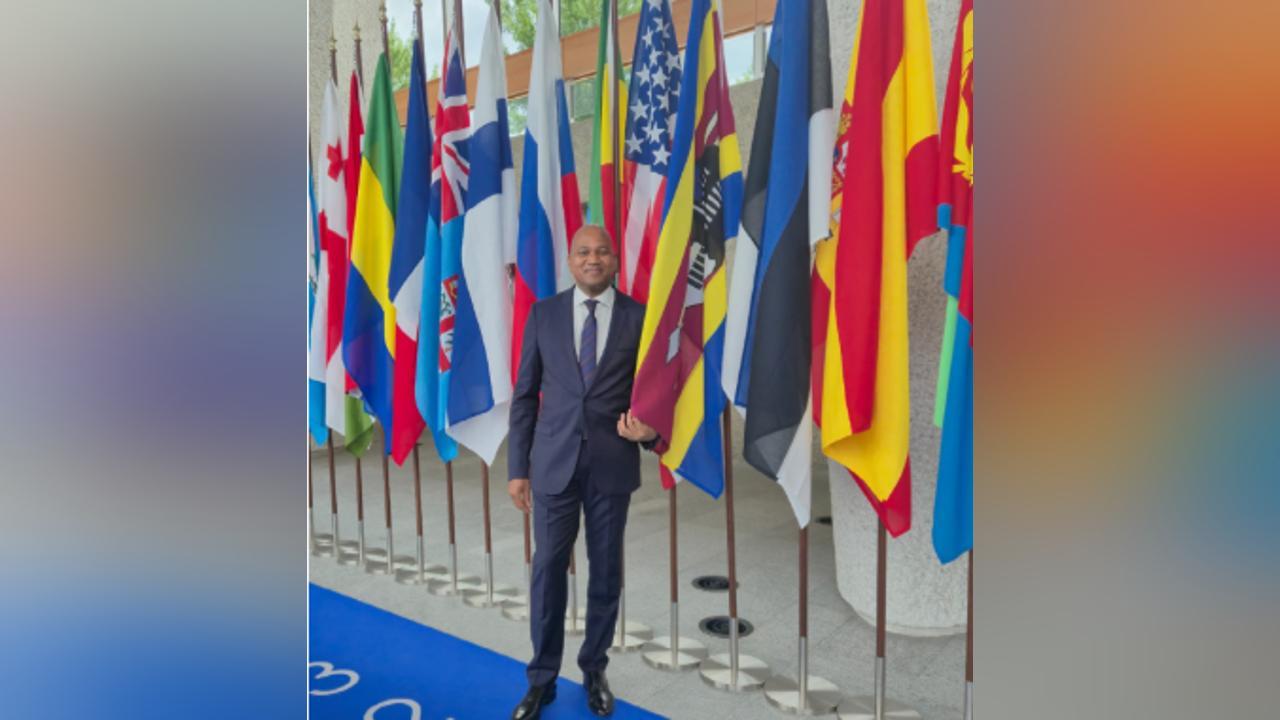Africa-Press – Eswatini. Business Eswatini (BE), the leading voice of the private sector in the Kingdom of Eswatini, is making a formidable impression at the 112th session of the International Labour Conference (ILC), in Geneva, Switzerland last week.
At the heart of this year’s landmark gathering is a topic that’s redefining global commerce and labour the Standard Setting on the Platform Economy.
This year’s ILC sees global leaders, employers, trade unions, and policymakers converge to navigate the evolving world of work particularly how emerging digital platforms are transforming labour markets, employment relations, and economic frameworks.
Business Eswatini President Mvuselelo Fakudze holds the Eswatini flag.
Representing Eswatini on this global stage are BE President Mvuselelo Fakudze, who also serves as the Chief Executive of Standard Bank Eswatini, and BE’s Chief Executive Officer E. Nathi Dlamini.
Their active participation not only signals Eswatini’s commitment to forward-thinking economic dialogue but also reinforces BE’s determination to keep the country’s business community attuned to global labour and economic shifts.
Speaking from Geneva, President Fakudze described the platform economy discussions as both intense and consequential.
“The impact of the Geneva Convention on the Platform Economy will be cross cutting no industry will be left untouched. The sheer urgency and energy in the plenary debates demonstrate how pivotal this issue is to the global future of work.” said Fakudze.
Fakudze has taken particular interest in how digital transformation is dismantling and rebuilding traditional business models.
With a background in financial services, he pointed to the irreversible shift in banking from analogue systems to agile, digitized platforms.
“At Standard Bank Eswatini, we are already embracing these changes. We’re delivering solutions that didn’t exist five years ago and this is just the beginning,” he explained.
“ However alongside innovation comes a redefinition of work itself. We’re looking at new roles, new skills, and entirely new employment models.
Our responsibility as business leaders is not only to adapt, but to do so with foresight and integrity ensuring that decent work remains at the heart of everything we pursue.” he said.
Fakudze also addressed the pressing need for clarity in how workers within the platform economy are identified and protected.
“Referring to them simply as ‘digital platform workers’ glosses over the complex realities of this sector. These are not homogenous roles we need nuanced, globally informed definitions that reflect the diversity of labour in this space,” he noted.
Such clarity, he argued, is vital to ensuring fair labour practices, providing appropriate social protections, and creating regulatory frameworks that allow both businesses and workers to thrive in this evolving economy.
Echoing and amplifying these sentiments, BE Chief Executive Officer E. Nathi Dlamini underscored the significance of Eswatini’s presence in Geneva not merely as participants, but as influencers in a global dialogue.
“Our mission here is not just symbolic it’s strategic. Business Eswatini is here to ensure the perspectives of Eswatini’s private sector are not lost in translation.
The platform economy is not something we’re waiting for it’s already here. We need to be shaping the regulatory environment now, before it shapes us.” Dlamini.
Dlamini added that BE is deeply invested in preparing Eswatini’s business ecosystem to respond effectively to the changes being debated on the global stage.
“We’re not here to observe we’re here to learn, to contribute, and to return home with strategies and insights that will empower our local businesses,” he said.
Business Eswatini CEO E. Nathi Dlamini.
The platform economy, broadly encompassing gig work, digital marketplaces, ride-hailing services, and AI-driven business models, is rapidly revolutionizing how companies operate.
It is shifting the very DNA of employment from fixed contracts and office cubicles to task-based, location-flexible, tech-enabled engagements.
While these shifts offer exciting opportunities for innovation and economic growth, they also introduce pressing concerns about job security, fair pay, working conditions, and access to social protections.
The challenge for regulators and business leaders alike is to strike a delicate but essential balance: enabling innovation while ensuring that workers’ rights are not left behind in the digital dust.
Through its proactive engagement at the ILC, Business Eswatini is positioning itself and the nation as a thoughtful contributor to this balance.
BE’s leadership ensures three critical outcomes for Eswatini’s private sector:
1. Advocacy for Fair and Inclusive Policies: BE is championing a regulatory framework that supports innovation while upholding worker protections. This includes pushing for clarity in worker definitions, encouraging decent work conditions, and resisting exploitative models.
2. Representation on the Global Stage: By maintaining a strong presence at international forums like the ILC, BE is making sure that Eswatini’s unique economic context and aspirations are considered in the creation of global labour standards.
3. Local Business Empowerment: The delegation is actively engaging with global employers and policy experts, gathering actionable knowledge that will be shared with Eswatini’s business community to future-proof operations and workforce development.
As the ILC progresses, BE remains focused on ensuring that Eswatini’s private sector is not a passive recipient of global policy but a meaningful participant in shaping it.
The platform economy may be borderless, but so is the responsibility to build a fairer, more inclusive future of work.
In the words of President Fakudze: “We must plan ahead, adopt early, and place dignity at the center of progress. This is our moment not just to keep pace with change, but to help steer it.”
For More News And Analysis About Eswatini Follow Africa-Press







